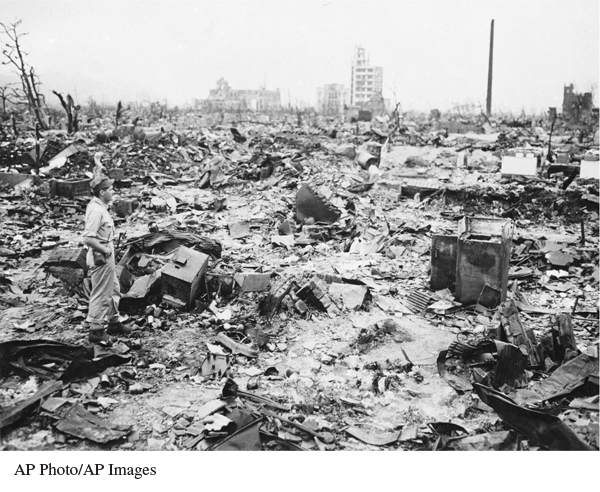A History of Western Society: Printed Page 937
A History of Western Society, Value Edition: Printed Page 898
A History of Western Society, Concise Edition: Printed Page 938
Allied Victory
The balance of power was now clearly in Allied hands, yet bitter fighting continued in Europe for almost two years. Germany, less fully mobilized for war in 1941 than Britain, stepped up its efforts. The German war industry, under the Nazi minister of armaments Albert Speer, put to work millions of prisoners of war and slave laborers from across occupied Europe. Between early 1942 and July 1944, German war production tripled despite heavy Anglo-
German resistance against Hitler also failed to halt the fighting. An unsuccessful attempt by conservative army leaders to assassinate Hitler in July 1944 only brought increased repression by the fanatic Nazis who had taken over the government. Closely disciplined by the regime, frightened by the prospect of unconditional surrender, and terrorized by Nazi propaganda that portrayed the advancing Russian armies as rapacious Slavic beasts, the Germans fought on with suicidal resolve.
On June 6, 1944, American and British forces under General Dwight Eisenhower landed on the beaches of Normandy, France, in history’s greatest naval invasion. In a hundred dramatic days, more than 2 million men and almost half a million vehicles broke through the German lines and pushed inland. Rejecting proposals to strike straight at Berlin in a massive attack, Eisenhower moved forward cautiously on a broad front. Not until March 1945 did American troops cross the Rhine and enter Germany. By spring of 1945 the Allies had finally forced the Germans out of the Italian peninsula. That April, Mussolini was captured in northern Italy by Communist partisans and executed, along with his mistress and other Fascist leaders.
The Soviets, who had been advancing steadily since July 1943, reached the outskirts of Warsaw by August 1944. Anticipating German defeat, the Polish underground Home Army ordered an uprising, so that the Poles might take the city on their own and establish independence from the Soviets. The Warsaw Uprising was a tragic miscalculation. Citing military pressure, the Red Army refused to enter the city. Stalin and Soviet leaders thus allowed the Germans to destroy the Polish insurgents, a cynical move that paved the way for the establishment of a postwar Communist regime. Only after the decimated Home Army surrendered did the Red Army continue its advance. Warsaw lay in ruins, and between 150,000 and 200,000 Poles — mostly civilians — had lost their lives.
Over the next six months, the Soviets moved southward into Romania, Hungary, and Yugoslavia. In January 1945 the Red Army crossed Poland into Germany, and on April 26 met American forces on the Elbe River. The Allies had overrun Europe and closed their vise on Nazi Germany. As Soviet forces fought their way into Berlin, Hitler committed suicide, and on May 8 the remaining German commanders capitulated.
The war in the Pacific also drew to a close. Despite repeated U.S. victories through the summer of 1945, Japanese troops had continued to fight with enormous courage and determination. American commanders believed the invasion and conquest of Japan itself might cost 1 million American casualties and claim 10 to 20 million Japanese lives. In fact, Japan was almost helpless, its industry and dense, fragile wooden cities largely destroyed by intense American bombing. Yet the Japanese seemed determined to fight on, ready to die for a hopeless cause.

After much discussion at the upper levels of the U.S. government, American planes dropped atomic bombs on Hiroshima and Nagasaki in Japan on August 6 and 9, 1945. The mass bombing of cities and civilians, one of the terrible new practices of World War II, now ended in the final nightmare — unprecedented human destruction in a single blinding flash. On August 14, 1945, the Japanese announced their surrender. The Second World War, which had claimed the lives of more than 50 million soldiers and civilians, was over.